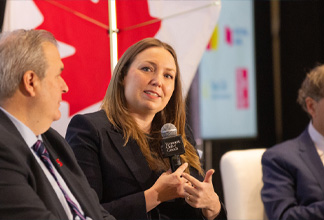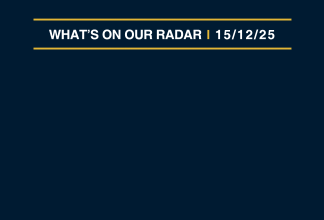Bank of Canada Lifts Key Interest Rate to 0.5%
Written by RBC Economics
Published on March 2, 2022
minute read
Share:
The following report was published by RBC Economics on March 2, 2022, under the title Liftoff! BoC hikes rate from lower bound
The Bank of Canada (BoC) lifted its policy rate for the first time since 2018, to 0.5 per cent, having kept it near zero for nearly two years of the pandemic.
The Russian invasion of Ukraine was noted as a major new source of uncertainty, but after a close call not to hike in January, there appeared to be a low bar to raise rates today and recent data easily cleared it.
While January's jobs numbers were disappointing (200,000 jobs lost, unemployment rate +0.5 percentage points) the labour market has bounced back quickly from past waves of COVID-19, and falling case counts and easing restrictions suggest the post-Omicron rebound should be equally robust. GDP growth was stronger than expected in Q4 and Statistics Canada's flash estimate surprisingly suggested the economy didn't contract in January, lending upside risk to Q1 growth. The bank said recent GDP data “confirms its view that economic slack has been absorbed." January's inflation print was in line with the BoC's forecast but further gains are likely in the near-term given rising food and energy commodity prices related to the Russia-Ukraine conflict.
The BoC will have to weigh additional inflationary pressure brought on by that conflict against two-way domestic impacts (increased revenue for commodity producers, higher prices for consumers) and concerns about the global economic outlook. Central banks would normally look through geopolitically-driven commodity price pressures, but with inflation already so far above target the BoC has said it is more concerned about upside risks to inflation than downside. Indeed, it said “persistently elevated inflation is increasing the risk that longer-run inflation expectations could drift upwards."
In addition to inflation expectations, the bank will be keeping an eye on financial conditions. Government bond yields have fallen amid growth concerns and rising risk aversion, but corporate credit spreads have widened. Other financial channels have been fairly steady—the Canadian dollar has been in a tight range over the past month and the TSX has held up well relative to other equity markets. At this early stage, we don't think geopolitical developments preclude a follow-up hike in April, nor do they argue for the more aggressive tightening path that markets continue to price.
Consistent with previous guidance, the BoC said it will “be considering when to end the reinvestment phase and allow its holdings of Government of Canada bonds to begin to shrink." We've yet to see a topic for Governor Macklem's economic progress report tomorrow but think he could use the speech to provide more details on what quantitative tightening (QT) will look like—whether the BoC plans to gradually phase out reinvestment or immediately shift to a smaller share of primary market purchases.
Those details could be followed by an actual QT announcement as soon as April's meeting depending on how financial conditions evolve in the interim. We'll of course also be looking for any comments on how the Russia-Ukraine conflict will impact Canada's economy and the path for monetary policy.
This report was authored by Josh Nye, a senior economist at RBC. His focus is on macroeconomic outlook and monetary policy in Canada and the United States.
RBC Direct Investing Inc. and Royal Bank of Canada are separate corporate entities which are affiliated. RBC Direct Investing Inc. is a wholly owned subsidiary of Royal Bank of Canada and is a Member of the Investment Industry Regulatory Organization of Canada and the Canadian Investor Protection Fund. Royal Bank of Canada and certain of its issuers are related to RBC Direct Investing Inc. RBC Direct Investing Inc. does not provide investment advice or recommendations regarding the purchase or sale of any securities. Investors are responsible for their own investment decisions. RBC Direct Investing is a business name used by RBC Direct Investing Inc. ® / ™ Trademark(s) of Royal Bank of Canada. RBC and Royal Bank are registered trademarks of Royal Bank of Canada. Used under licence.
© Royal Bank of Canada 2022.
Any information, opinions or views provided in this document, including hyperlinks to the RBC Direct Investing Inc. website or the websites of its affiliates or third parties, are for your general information only, and are not intended to provide legal, investment, financial, accounting, tax or other professional advice. While information presented is believed to be factual and current, its accuracy is not guaranteed and it should not be regarded as a complete analysis of the subjects discussed. All expressions of opinion reflect the judgment of the author(s) as of the date of publication and are subject to change. No endorsement of any third parties or their advice, opinions, information, products or services is expressly given or implied by RBC Direct Investing Inc. or its affiliates. You should consult with your advisor before taking any action based upon the information contained in this document.
Furthermore, the products, services and securities referred to in this publication are only available in Canada and other jurisdictions where they may be legally offered for sale. If you are not currently resident of Canada, you should not access the information available on the RBC Direct Investing Inc. website.
Explore More

7 Ways to Get Ahead Financially in 2026
How you might invigorate your finances and put your money to work more intentionally this year
minute read

Economic Outlook: Uncertainty is Here to Stay, So What's Next?
Takeaways from the Economic Club of Canada’s Annual Event
minute read

3 things: Week of December 15
What the Inspired Investor team is watching this week
minute read
Inspired Investor brings you personal stories, timely information and expert insights to empower your investment decisions. Visit About Us to find out more.







